Farm-to-Smith Eating
Sustainability
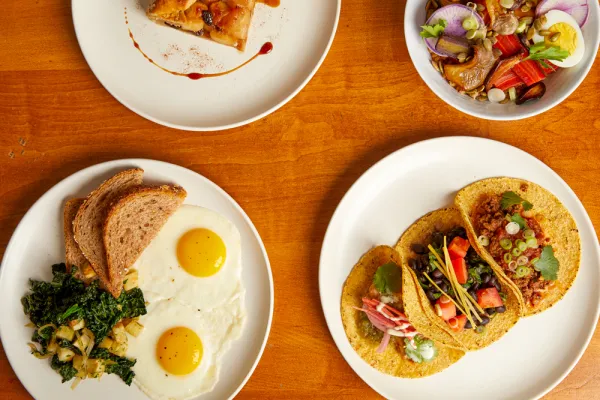
Published March 17, 2020
In 2016, one year after Andy Cox was named director of dining services at Smith, the college signed on to the Real Food Challenge, joining 42 other institutions nationwide in pledging to buy at least 20 percent “real food”—food that’s local and community based, fair, ecologically sound and/or humane—by 2020.
Cox, who has a degree in sustainability management and a certificate in sustainable food and farming, blasted past that goal, spending 19.1 percent of his budget on real food in 2017, 26.75 percent in 2018 and 30 percent last year.
He’s had the most success in the “local and community based” category. Smith’s regional (Northeast) food purchases shot up from about $225,000 in 2015 to $850,000 in 2019. Meanwhile, its western Massachusetts food purchases, which weren’t even tracked before 2018, accounted for more than $375,000 last year.
These dollars have a direct impact on the fight against climate change. As The New York Times reported in 2019, the global food system accounts for about one-quarter of the planet-warming greenhouse gases that humans generate each year. That includes raising and harvesting all the plants, animals and animal products we eat as well as processing, packaging and shipping food to markets all over the world. “If you eat food,” the Times noted, “you’re part of this system.”
“Smith is on the leading edge of sustainability initiatives and food systems innovation in college and university dining.”
Meat generally has the largest impact on climate change, so it’s notable that Smith’s animal product purchases are down 3.2 percent from 2016 to 2019. And the meat that Smith is buying is more sustainable, thanks in part to a $250,000 New England Food Vision Prize from the Henry P. Kendall Foundation. The prize has enabled Smith, in partnership with Amherst and Mount Holyoke colleges and Westfield State University, to purchase grass-fed cows and pastured pigs directly from New England farms for nose-to-tail use in campus dining—a major shift away from factory farming.
“Climate change is a complex, urgent problem, but dining services is taking specific steps to fight it,” Cox says. “Between beating our Real Food Challenge goals and winning the New England Food Vision Prize, Smith has demonstrated that it’s on the leading edge of sustainability initiatives and food systems innovation in college and university dining. We’re proud of what we’ve achieved so far and excited to make even more progress in the future.”
The plates below were prepared by Dino Giordano, executive chef of dining services at Smith. They illustrate the college’s commitment to real food and serve as a delicious reminder of Smith’s effort to shrink its climate footprint.
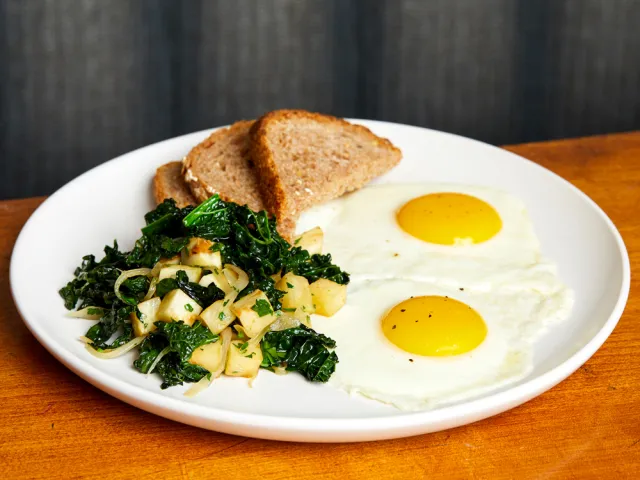
BREAKFAST
- Cage-free eggs from Maine Family Farms in Portland, ME
- Organic multigrain bread from Berkshire Mountain Bakery in Housatonic, MA
- Organic lacinato kale and organic celeriac from Atlas Farm in South Deerfield, MA
- Yukon gold potatoes from Outlook Farm in Westhampton, MA
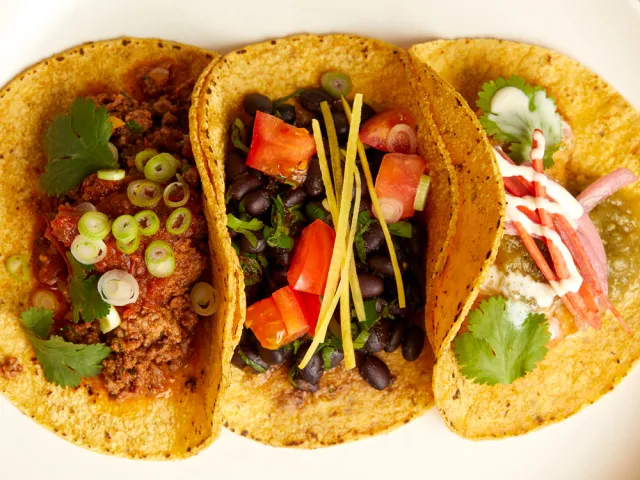
TACOS
- Organic corn tortillas from Mi Tierra Tortillas in Hadley, MA, made with locally grown corn
- Antibiotic-free, hormone-free ground beef from Poplar Hill Farm in West Whately, MA, whose cattle are pastured at Smith’s MacLeish Field Station
- Haddock from BerkShore, a western Massachusetts fishmonger that travels to the Boston Fish Pier five times per week and delivers the same day
- Black turtle beans from Baer’s Best Beans in South Hamilton, MA
- Organic red onions from Sawyer Farm in Worthington, MA, which uses horses instead of tractors
- Organic roasted chili salsa and organic tomatillo salsa from Kitchen Garden Farm in Sunderland, MA
- Cultured sour cream from Sidehill Farm in Hawley, MA
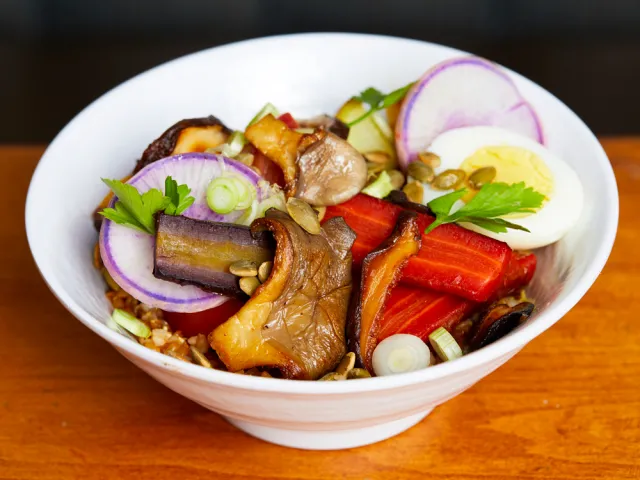
GRAIN BOWL
- Organic einkorn, a wheat berry, from Farmer Ground Flour in Trumansburg, NY
- Organic oyster and shiitake mushrooms from Mycoterra Farm in South Deerfield, MA
- Organic purple daikon radishes and organic rainbow carrots from Queen’s Greens in Amherst, MA
- Organic Chioggia and golden beets from Winter Moon Roots in Hadley, MA
- Tomatoes from Backyard Farms in Madison, ME
- Cage-free eggs from Maine Family Farms in Portland, ME
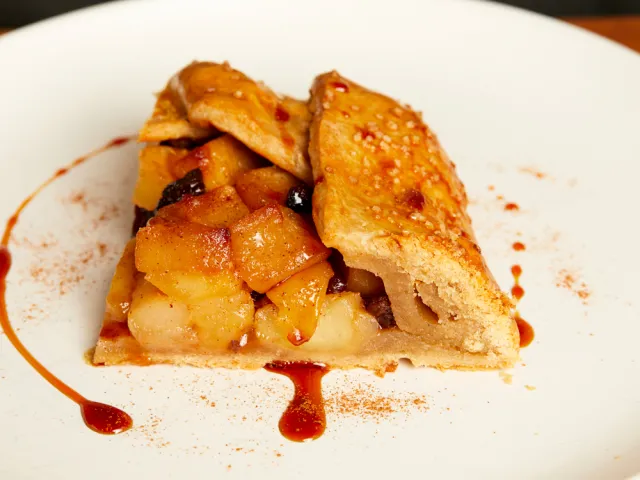
APPLE GALETTE
- Low-spray Braeburn apples from Outlook Farm in Westhampton, MA
- Organic all-purpose flour from Farmer Ground Flour in Trumansburg, NY
- Maple syrup from North Hadley Sugar Shack in Hadley, MA
- Cider syrup from Carr’s Ciderhouse in Hadley, MA
This story appears in the Spring 2020 issue of the Smith Alumnae Quarterly.
SMITH ALUMNAE QUARTERLY
Special Climate Issue
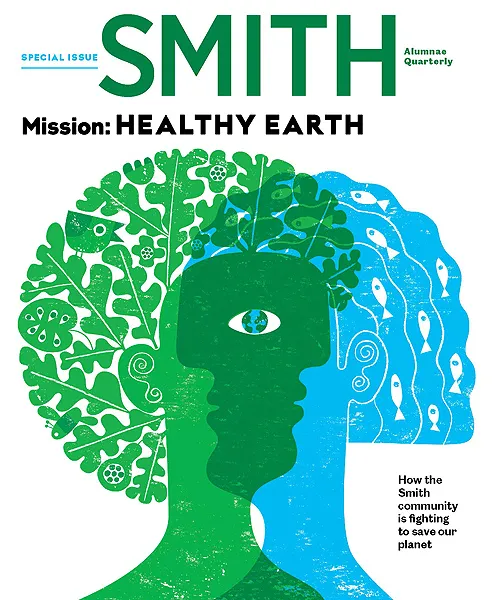
Mission: HEALTHY EARTH
How the Smith community is fighting to save our planet
Photographs by Dominic Perri; Styled by Dino Giordano